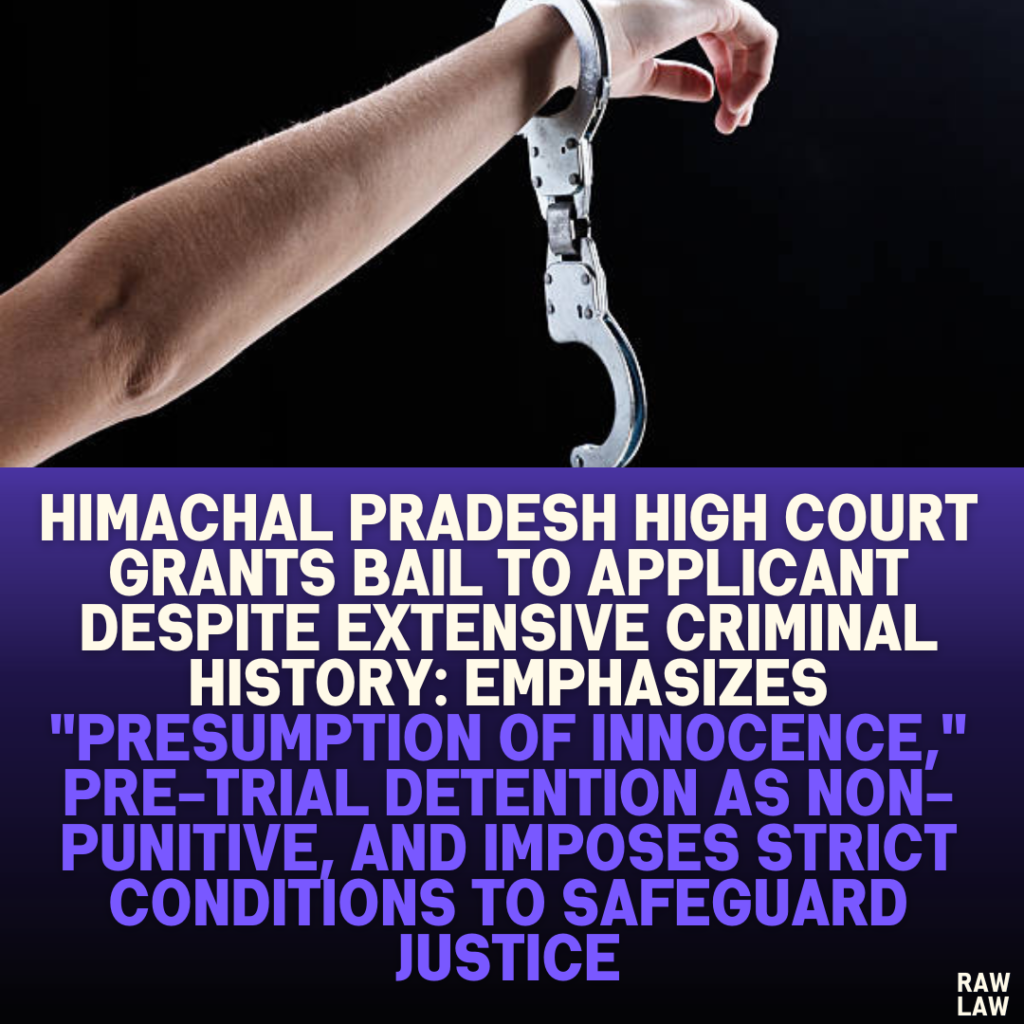Court’s Decision
The Himachal Pradesh High Court granted bail to the applicant under Section 483 of the Bharatiya Nagarik Suraksha Sanhita, 2023 (BNSS), in connection with theft-related charges under Sections 303(2) and 61(2) of the Bharatiya Nyaya Sanhita, 2023 (BNS). The court emphasized that “presumption of innocence is still available” to the accused, even with multiple criminal cases registered against him, as there were no convictions. Strict conditions were imposed on the grant of bail to ensure fair proceedings.
Facts
The applicant was arrested on September 27, 2024, for his alleged involvement in a vehicle theft incident where CCTV footage showed suspicious activities. The stolen vehicle was recovered near Mandi, Himachal Pradesh, and linked to the applicant. The accused was found in another vehicle connected to the incident. The prosecution highlighted ten prior cases registered against the applicant in Jammu and Kashmir, involving theft, assault, and other offenses, though no convictions were reported.
The bail application was previously rejected by the Additional Chief Judicial Magistrate and the Sessions Court before being presented to the High Court.
Issues
- Whether the applicant should be granted bail despite his criminal history.
- Whether keeping the applicant in custody would serve the ends of justice during the investigation and trial.
Petitioner’s Arguments
- The applicant argued that the investigation had concluded and no purpose would be served by keeping him in custody.
- He claimed innocence and highlighted the lack of convictions in previous cases.
- He undertook to comply with any conditions imposed by the court if released on bail.
Respondent’s Arguments
- The State opposed bail, citing the applicant’s past criminal record and the risk of absconding due to his residence in Jammu and Kashmir.
- Concerns were raised about the applicant potentially tampering with evidence, threatening witnesses, and engaging in similar criminal activities.
Analysis of the Law
The court referred to the principle of the presumption of innocence, affirming that pre-trial punishment is prohibited under the law. The court highlighted that criminal antecedents alone cannot justify the denial of bail, particularly in the absence of convictions.
Precedent Analysis
The judgment reiterated established principles regarding bail, particularly that detention should not be used as punitive pre-trial punishment. The court relied on the balancing act between safeguarding the interests of justice and the rights of the accused.
Court’s Reasoning
The court found that the applicant’s prolonged custody was unnecessary as the investigation had been completed, and his role in the crime would be established during the trial. The court dismissed the argument that the applicant’s residence in Jammu and Kashmir alone justified denying bail. It also stated that any apprehensions of witness intimidation or evidence tampering could be mitigated by imposing stringent conditions.
Conclusion
The High Court allowed the bail application, subject to the following conditions:
- The applicant must provide bail bonds worth ₹75,000 with two sureties.
- He must regularly attend trial hearings and cooperate with the investigation.
- He should not tamper with evidence or threaten witnesses.
- He cannot leave India without prior court approval.
The State was granted liberty to apply for bail cancellation in case of any violations.
Implications
The decision reinforces the legal principle that bail should not be denied merely due to an accused’s criminal record in the absence of convictions. It upholds the presumption of innocence and emphasizes balancing rights and fair trial safeguards.
